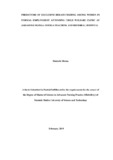| dc.contributor.author | Moraa, Damaris | |
| dc.date.accessioned | 2019-03-13T07:30:54Z | |
| dc.date.available | 2019-03-13T07:30:54Z | |
| dc.date.issued | 2019-02 | |
| dc.identifier.uri | http://r-library.mmust.ac.ke/123456789/1266 | |
| dc.description | MASTERS THESIS | en_US |
| dc.description.abstract | Breast-feeding lays the foundation for healthy growth and child development. Despite the documented benefits of exclusively breast-feeding, studies have found that several predictors influence the duration of breast-feeding and few researches have assessed the predictors of exclusive breast-feeding among women informal employment in Kenya. The objective of this study was to determine the predictors of exclusive breast-feeding among mothers in formal employment attending child welfare clinic at the Jaramogi Oginga Odinga Teaching and Referral Hospital (JOOTRH). Descriptive analytical cross-sectional design was used in the study. Three hundred and ninety-one (391) women in formal employment with infants aged one year and below were purposively sampled. Fifty-one (51%) of the women in formal employment were practicing EBF. The study identified three elements as predictors of EBF; respondents who were more knowledgeable on the benefits of EBF to the mother (aOR=3.22, 95% CI [1.63-6.35], p-0.001) were 3 times more likely to EBF while those who delivered in public hospitals (aOR=12.48, 95%CI [1.46-10.7], p-0.021) were 12 times more likely to EBF than those that delivered in private hospitals. The study also revealed that women who were more knowledgeable on risks of failure to EBF their babies had higher odds of EBF (aOR=4.10, 95% CI [2.07-8.12], p<0.001). The major constraints hindering women in formal employment from practicing EBF were resumption to work after delivery, lack of breast-feeding facilities at work place, support and long working hours. The predictors of Exclusive breastfeeding among women in formal employment include knowledge and place of delivery. Though the women are knowledgeable on EBF several challenges hinder them from effectively practicing EBF. There is therefore urgent need for strategies that will enhance EBF for women in formal employment. | en_US |
| dc.description.sponsorship | SCHOOL OF NURSING AND MIDWIFERY. | en_US |
| dc.publisher | MMUST | en_US |
| dc.subject | Breast-feeding | en_US |
| dc.subject | growth and child development | en_US |
| dc.subject | Jaramogi Oginga Odinga Teaching and Referral Hospital | en_US |
| dc.title | PREDICTORS OF EXCLUSIVE BREAST-FEEDING AMONG WOMEN IN FORMAL EMPLOYMENT ATTENDING CHILD WELFARE CLINIC AT JARAMOGI OGINGA ODINGA TEACHING AND REFERRAL HOSPITAL | en_US |

